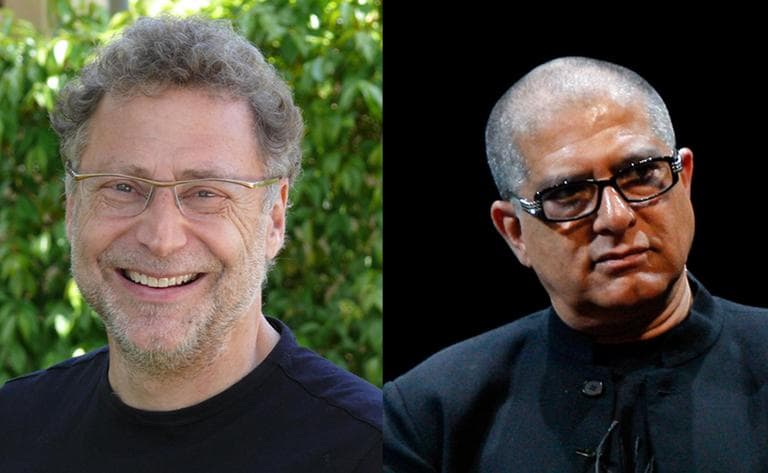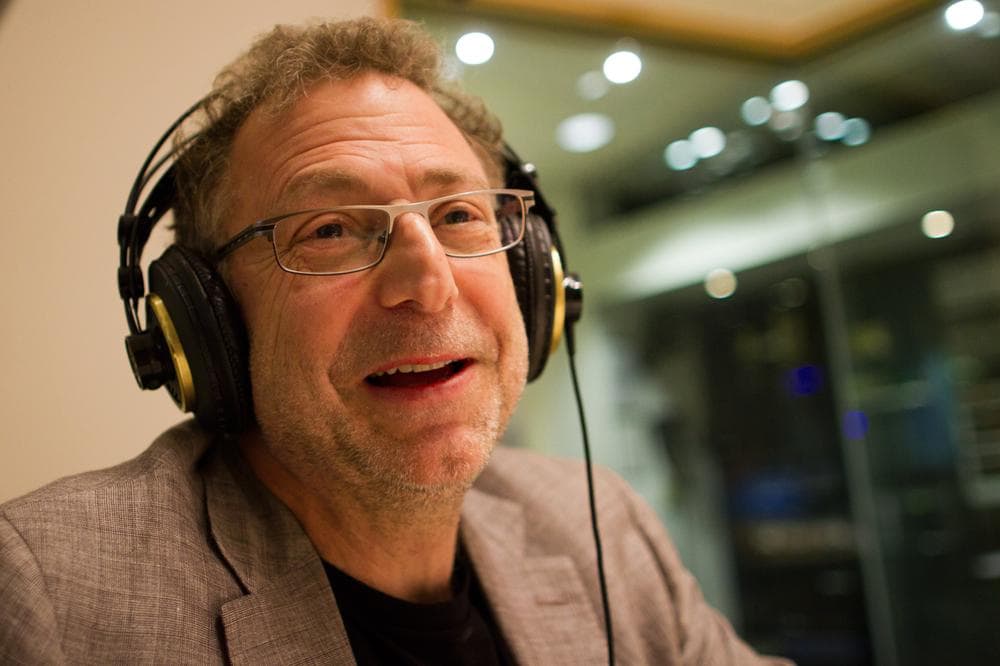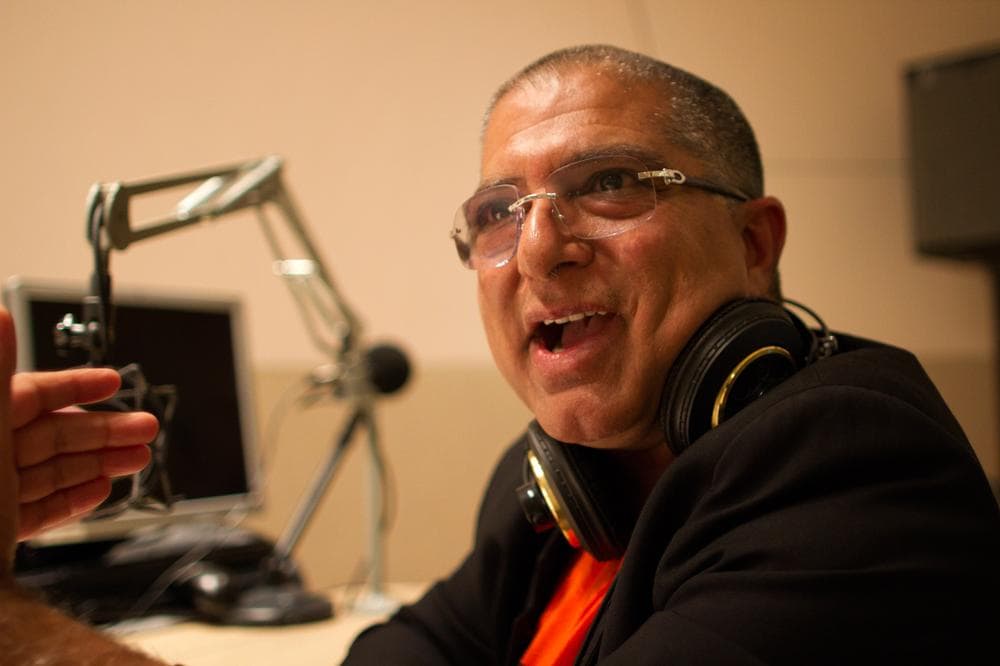Advertisement
Science And The Spirit
ResumeDeepak Chopra and physicist Leonard Mlodinow join us to talk science and spirit.

America was built on science. America was rooted in religion. For 200 years, both thrived. In the last quarter-century, they’ve clashed. And the clash has been costly.
Can we settle this? Maybe. We’ve got two big figures with us today who have taken on the war of worldviews.
Man of spirit, Deepak Chopra. Man of science, Leonard Mlodinow. One a giant in the realm of spiritual guidance. One a Stephen Hawking-scale master of physics and the scientific way.
Both ready to hash it out.
This hour On Point: Deepak Chopra and Leonard Mlodinow, on science and spirit.
-Tom Ashbrook
Guests
Deepak Chopra, doctor, spiritual icon, and writer on subjects such as spirituality and mind-body medicine. Co-author of: “War of the Worldviews: Science vs. Spirituality.”
Leonard Mlodinow, theoretical Physicist and Professor of Physics at the California Institute of Technology. Co-author of: “War of the Worldviews: Science vs. Spirituality.”
Photos


From Tom's Reading List
Time "To chart the transformation of Deepak Chopra from just another proponent of holistic health and nutrition into the international supersage he is today, one needn't look further than the covers of two of his books. On the back of 1997's The Path to Love, Chopra stares out at us wearing a black coat and white collarless shirt that give him a vaguely clerical look."
The Huffington Post "We ran up the stairs, our heels clicking over wooden floors and down again, clattering against the back metal stairs where we found Deepak Chopra climbing out of the Hertz rental hybrid supplied just for this occasion. The driver had taken Chopra to the wrong entrance so a colleague and I rushed to meet and welcome him to the WIE Symposium. Chopra had just gotten in from Boston where he'd met with 2,000 cardiologists."
Excerpt
Foreword
Nothing is more mysterious than another person’s worldview. Each of us has one. We believe that our worldview expresses reality. The Native Americans of the Southwest traveled hundreds of miles to hunt buffalo but never ate fish from their local streams. In their worldview, it was real that fish were the spirits of departed ancestors. In the Old Testament it was real that animal sacrifices appeased God’s wrath; to the everyday Roman it was real that the future could be foretold in the entrails of a chicken. To the ancient Greeks it was real that a moral individual could keep slaves and that there existed many gods, of love and beauty, war, the underworld, the hunt, the harvest, the sea.
What happens, then, when two worldviews clash? In 399 BCE three Athenian citizens accused Socrates of refusing to recognize the traditional gods and introducing new divinities instead (he was also accused of corrupting their youth). The penalty for this clash of worldviews, or gods, was death. During his trial Socrates refused to back down or to flee from a certain verdict of guilty. According to Plato, he said, “So long as I draw breath and have my faculties, I shall never stop practicing philosophy.” Unfortunately, in many parts of the world today, a clash of worldviews is still met with violence and death.
This book is about a clash of worldviews, but no blows were exchanged. The book came about when two strangers met at a televised debate on “the future of God.” The setting was an auditorium at the California Institute of Technology, and the audience was composed of many scientists and students, but also of laypeople, including Deepak’s fans from the surrounding community. Each of them brought his or her own personal beliefs— no doubt some of them were religious— but they also brought their own worldview, which runs much deeper than belief.
In the Caltech debate Deepak served as the defender of a worldview broadly known as spiritual. Since the ideas of physics became an issue, during the question- and- answer period Deepak asked, “Is there a physicist in the house?” Neither Leonard nor anyone else answered. But after the debate, the moderator, who recognized Leonard as a physicist, pulled him out of the audience to ask Deepak a question. Leonard instead offered to teach him about quantum physics. Deepak accepted— to a mixture of laughter and applause— and as we started to communicate, we found ourselves strongly disagreeing about our worldviews. Realizing the depth of our clash, we decided to have it out in this book.
Science has set humanity on a path to unravel the secrets of nature, harness natural forces, and develop new technologies, using reason and observation instead of emotional bias as a tool for uncovering the truth of things. Spirituality looks toward an invisible, transcendent realm discovered within the self. Science explores the world as it is offered to the five senses and the brain, while spirituality considers the universe to be purposeful and imbued with meaning. In Deepak’s view, the great challenge for spirituality is to offer something that science cannot provide— in particular, answers that lie in the realm of consciousness.
Which worldview is right? Does science describe the universe, or do ancient teachings like meditation unravel mysteries that are beyond the worldview of science? To find out, this book explores the clash of worldviews on three levels: the cosmos, or physical universe; life; and the human brain. Finally, we also explore the ultimate mystery, God. In “Cosmos” we argue about where the universe came from, its nature, and where it is going. In “Life” we debate evolution, genetics, and the origin of life. “Mind and Brain” addresses neuroscience and raises all the issues of mind and body. And “God” refers not only to a presiding deity but also to the broader concept of a divine presence in our universe.
This book covers eighteen topics in total, with essays from both authors. Each of us told his side of the story, one topic at a time, but whoever came second on any given topic did so with the other’s text in hand, feeling free to present a rebuttal. Since rebuttals tend to persuade audiences, we tried to be as fair as possible about who got that advantage.
Each of us believes deeply in the worldview he represents. We have written fiercely but respectfully to define the truth as we see it. No one can ignore the question of how to perceive the world. The best we can do— writers and readers alike— is to leap into the fray. What else could be more important?
Deepak Chopra
Leonard Mlodinow
Excerpted from War of the Worldviews: Science vs. Spirituality Copyright @ 2011 by Deepak Chopra & Leonard Mlodinow. Reprinted by Permission of Harmony, an imprint of the Crown Publishing Group, a division of Random House, Inc., New York.
This program aired on October 6, 2011.